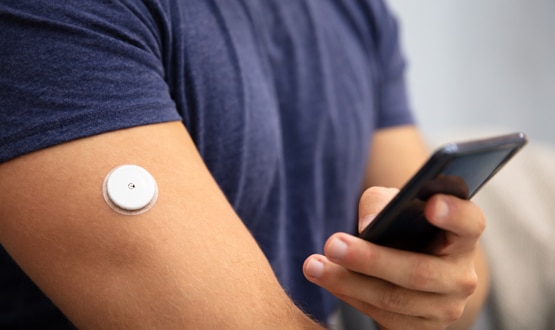NHS should ‘prescribe FitBits’ to prevent inequality in health tech

The NHS should prescribe fitness trackers and other personal health technology to people who would be unable to purchase these tools themselves, a think tank has said.
The Social Market Foundation (SMF) report, National Health Servers: delivering digital health for all, found access to improved health outcomes, such as FitBits and smart scales, should not be limited by a person’s ability to pay for innovative technology.
The report examined the patient’s journey through the NHS, from prevention and diagnosis, primary and secondary care through to management of long-term conditions.
It found there are “huge opportunities” to keep patients out of the NHS using digital technologies, but that access to technology needs to be equal.
Kathryn Petrie, senior economist and author of the report, said: “Technology has the potential to deliver better healthcare, but it is vitally important that those benefits are available to all, and not just the people with the means to take full advantage.
“There is a risk that unequal access to health technology will further exacerbate the existing health inequalities in the UK.”
The recently published Topol Review also noted that technology had the potential to worsen health inequality if not used correctly. The SMF report warned technology may influence the ability of the NHS to provide universal care if it encourages inequality.
“If personal technologies, such as wearables or smart home devices become a primary delivery channel for improving health outcomes, there is a significant risk that only those who can afford the latest devices are able to benefit,” it said.
“This raises the question of how technology may influence the ability of the NHS to continue to offer a universal service accessible to all, if those from the most affluent backgrounds have better access to cutting edge health technology.”
In response to the report, Harry Aagaard Evans, researcher at The King’s Fund, said: “It’s important to build digital skills to ensure everyone can benefit from technology. It is also important that it is not just the wealthy who get the benefits of consumer health technology, like wearables.
“However, simply providing access to technology is not enough to ensure low income groups can get health benefits from it. Ensuring technology doesn’t exacerbate health inequalities requires proven and tailored interventions of which technology is just one component, and where in-person support is provided.”
The NHS is currently piloting schemes that allow Clinical Commissioning Groups to offer fitness trackers to some individuals. The SMF is calling on the NHS to consider the programme more widely, even though it’s too early to know if the intervention is good value for money.
In 2017 NHS England (NHSE), Public Health England and Diabetes UK launched a diabetes and obesity prevention pilot project for 5,000 people offering wearables, apps and other gadgets to manage their condition, which feeds into its Diabetes Prevention Programme.
NHSE also runs the Widening Digital Participation Programme, in conjunction with Good Things Foundation, which has seen twenty digital inclusion pathfinders set up across the country to improve people’s digital skills.
But in order to close the inequality gap further, the report also calls on the NHS to prescribe digital skills classes to those who struggle to keep up with how quickly technology changes, particularly for those whose health would improve with access to technology.
Those with lowest household incomes are also those likely to have the least digital skills yet the most comorbidities, according to the report, but digital skills could help improve the health of one in three people over 60 and make them feel less alone.
Other policy recommendations made in the report include; initiating an honest debate on electronic patient records and how information is used in the wider healthcare setting, including explaining the value of patients sharing their personal data and making the opt-out system more straightforward; establishing clear priorities for digital services; pursuing integration as a priority project; and enshrining the right to digital services in the NHS Constitution.
NHS England was contacted for comment but did not respond.




6 Comments
Dave, I must apologise for conflating the 2 posts by commenting on the 2 previous ones. I share your reply completely. I understand to situation facing cancer patients from my patient experience as chairperson of an MSK charity. We were fortunate to have the chance to benefit from innovation funding to support self-management. Without the funding, this opportunity would not have been made possible for many members participating in the projects.
“Chris”,
I am not being cynical I am simply pointing out that technology, whether innovative or mainstream, can only ever be part of the solution to the health care crisis facing the UK.
As well as being an IT professional, I am a campaigner for a cancer charity. In recent years have seen a marked deterioration in basic services being delivered to patients.
The real cynics are those (including certain elements of the press) who attempt to pretend to the general public that the risks and issues associated with shortages of clinical and diagnostic staff, the aging population, the obesity crisis, the decimation of social care funding, the axing of public health services and a myriad of other negative factors can be mitigated by new technology.
Population health, applied genomic sequencing the application of IA and ML and other technologies to screening and investigative services can improve early diagnosis, enabling early treatment and better outcomes and have and continue to be an advocate for their early adoption. However, there needs to be capacity within the health and social care system to cope with the subsequent rise in demand. We currently have the ridiculous situation where many cancer patients are being diagnosed earlier but are having to wait longer for treatment unless they can afford to go private for their treatment.
Cynicism, reference to the tabloid press, will neither eliminate health equalities nor be an overall solution to preventing inequalities in health technology.
However, Personalised Medicine,
https://www.england.nhs.uk/healthcare-science/personalisedmedicine/ is a move away from a ‘one size fits all’ approach to the treatment and care of patients with a particular condition, to one which uses new approaches to better manage patients’ health and targets therapies to achieve the best outcomes in the management of a patient’s disease or predisposition to disease….
…New possibilities are now emerging as we bring together novel approaches, such as whole genome sequencing, data and informatics, and wearable technology.
“However, simply providing access to technology is not enough to ensure low income groups can get health benefits from it. Ensuring technology doesn’t exacerbate health inequalities requires proven and tailored interventions of which technology is just one component, and where in-person support is provided.”
This is the most important paragraph in the article. Government spin doctors and the tabloid press seem to latch onto technology as the panacea to resolve issues created by an aging, increasingly ill-informed population and the underfunding of healthcare. Tech can only ever be part of an overall solution. Health education of the public and behaviour change is key to breaking the vicious circle of poor diet, lack of exercise and avoidable health issues. It isn’t rocket science or science fiction. Eat less, stop smoking, drink less alcohol, eat better and exercise more is a boring solution, but is very effective!
This is a rampantly idiotic proposal, however I have every faith our lords and masters will embrace it
This is an important recommendation in view of the relationship between health inequality and poverty. A big step forward for health improvement and population health.
Comments are closed.